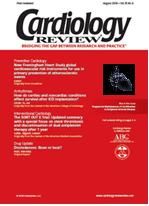Publication
Article
Cardiology Review® Online
Anticoagulation regimens after stent insertion
In this period of heightened concern over the increased risk of late and very late stent thrombosis with the use of drug-eluting stents, it is worthwhile to examine the anticoagulation regimens given after insertion of a stent.
In this period of heightened concern over the increased risk of late and very late stent thrombosis with the use of drug-eluting stents, it is worthwhile to examine the anticoagulation regimens given after insertion of a stent. The development of coronary stents has encouraged more widespread use of angioplasty by effectively reducing the acute complications of balloon angioplasty (acute vessel closure, myocardial infarction [MI], emergency bypass, and death). However, the early Palmaz-Schatz stent experience was marred by a high incidence of subacute thrombosis occurring in about 5% to 6% of patients in the first month after bare-metal stent placement. This was despite aggressive treatment with aspirin, dextran (Gentran, LMD), dipyridamole (Persantine), and IV heparin (Hep-Lock, HepFlush), bridging to continued warfarin (Coumadin) treatment.
Randomized clinical trials demonstrated the benefit of treatment with combined antiplatelet therapy, which quickly became the standard of care (aspirin plus ticlopidine [Ticlid] or clopidogrel [Plavix]) after coronary stenting. A Cordis-sponsored trial in 517 high-risk patients demonstrated a 7-fold decrease (0.8% vs 5.4%) in subacute thrombosis at 1 month with aspirin plus a thienopyridine over aspirin plus warfarin.1 The Stent Anti-Thrombotic Regimen Study, using a combined end point of death, angiographic thrombosis, target lesion revascularization, and MI in 1653 randomized, low-risk stented patients, demonstrated a decrease in events at 30 days with a dual-antiplatelet regimen (0.5%) compared with 325 mg of aspirin per day alone (3.6%) or 325 mg aspirin per day plus warfarin (2.7%).2
The major issue for interventionalists has been determining the optimal post-stent treatment for patients with an indication for continued warfarin therapy. There are no large, clinical randomized trials to support evidence-based practice in this common scenario. In this post-Clinical Outcomes Utilizing Revascularization and Aggressive Drug Evaluation study (COURAGE)3 era, optimized medical therapy and bypass surgery also tend to be weighed more favorably as alternatives to percutaneous revascularization.
The report from the Global Registry of Acute Coronary Events (GRACE) trial
is provocative in this context. Reporting on 800 acute coronary syndrome patients receiving coronary stents (130 drug-eluting), the researchers found no difference in major in-hospital bleeding, mortality, or MI at 6 months in patients treated with single- (aspirin or a thienopyridine; 220 patients) vs dual- (aspirin plus a thienopyridine; 580 patients) antiplatelet therapy and warfarin. Unfortunately, small and nonrandomized groups, treatment variability (eg, aspirin dose, thienopyridine choice, duration of antiplatelet therapy, target international normalized ratio [INR], and consistency of anticoagulation), and a lack of detailed follow-up limit the applicability of these findings to everyday practice.
Pending the results of large, randomized clinical trials or changes in professional society guidelines, the need for long-term warfarin therapy will continue to concern the interventionalist trying to balance the risks of bleeding with systemic thromboembolism and stent thrombosis. In the absence of specific guidance, my current practice is to: (1) more strongly weight a recommendation for medical therapy and coronary artery bypass graft surgery in this population; (2) consider balloon angioplasty with provisional stenting; (3) use bare metal-stents in preference over drug-eluting stents; (4) prescribe low-dose aspirin (81 mg/day) with warfarin; (5) prescribe clopidogrel for the recommended duration, not for an indefinite period; and (6) maintain the INR more tightly at the lower end of the therapeutic range. One thing is sure; this will be a source of controversy and medicolegal concern for some time to come.






